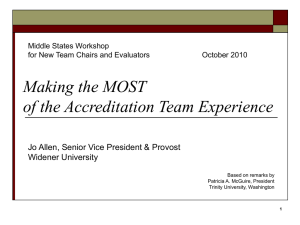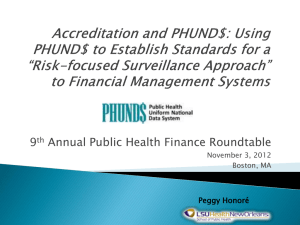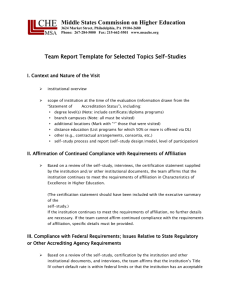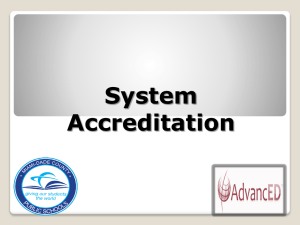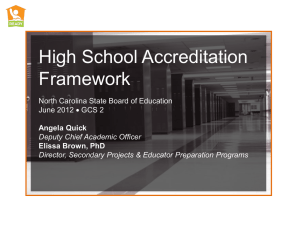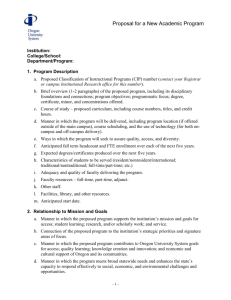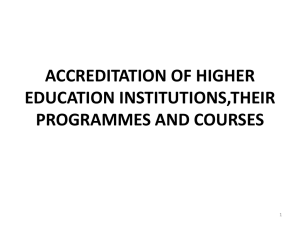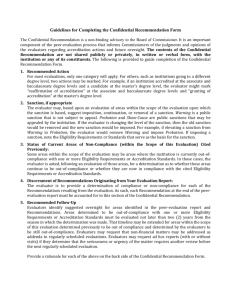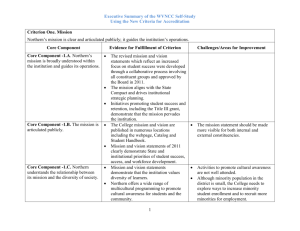Academic Affairs Program Review Guidelines
advertisement
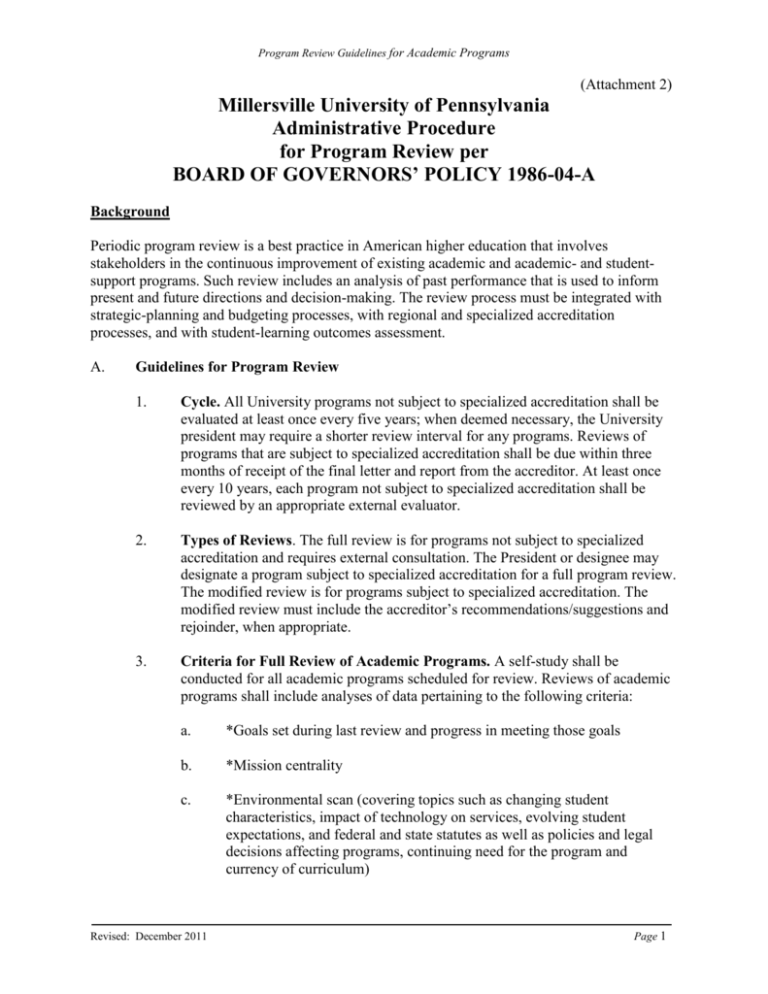
Program Review Guidelines for Academic Programs (Attachment 2) Millersville University of Pennsylvania Administrative Procedure for Program Review per BOARD OF GOVERNORS’ POLICY 1986-04-A Background Periodic program review is a best practice in American higher education that involves stakeholders in the continuous improvement of existing academic and academic- and studentsupport programs. Such review includes an analysis of past performance that is used to inform present and future directions and decision-making. The review process must be integrated with strategic-planning and budgeting processes, with regional and specialized accreditation processes, and with student-learning outcomes assessment. A. Guidelines for Program Review 1. Cycle. All University programs not subject to specialized accreditation shall be evaluated at least once every five years; when deemed necessary, the University president may require a shorter review interval for any programs. Reviews of programs that are subject to specialized accreditation shall be due within three months of receipt of the final letter and report from the accreditor. At least once every 10 years, each program not subject to specialized accreditation shall be reviewed by an appropriate external evaluator. 2. Types of Reviews. The full review is for programs not subject to specialized accreditation and requires external consultation. The President or designee may designate a program subject to specialized accreditation for a full program review. The modified review is for programs subject to specialized accreditation. The modified review must include the accreditor’s recommendations/suggestions and rejoinder, when appropriate. 3. Criteria for Full Review of Academic Programs. A self-study shall be conducted for all academic programs scheduled for review. Reviews of academic programs shall include analyses of data pertaining to the following criteria: a. *Goals set during last review and progress in meeting those goals b. *Mission centrality c. *Environmental scan (covering topics such as changing student characteristics, impact of technology on services, evolving student expectations, and federal and state statutes as well as policies and legal decisions affecting programs, continuing need for the program and currency of curriculum) Revised: December 2011 Page 1 Program Review Guidelines for Academic Programs (Attachment 2) d. *Demand *Enrollment trends Student credit-hour generation Course enrollments e. *Program Organization Structure – Include collaborations if appropriate. *Faculty credentials and diversity *Student diversity *Resources – Include items such as the following: Staffing levels, facilities, and budget, or actual costs *Library and other learning resources *Academic policies, standards, and grading practices f. Program and Student Learning Outcomes *Faculty achievements (e.g., grants, presentations, publications awards) *Student achievements (e.g., awards, presentations, publications, research) *Program outcomes – Include, as appropriate, items such as the following: Test scores, Retention data, 4- and 6-year graduation rates, Graduate- and professional school-acceptance, Employment rates, Employer assessments, and Economic or community development. *Student Learning Outcomes – describe the knowledge and skill outcomes and how they are assessed. g. Unique/special program features h. * 5-Year Strategic Plan with action plan. Faculty/staff in each program must develop an action plan for continuous enhancement by building upon strengths and addressing challenges. The action plan, which must also include goals and action items to be accomplished by the next review period, will become final only after it has had input by the external evaluator, and has been approved by the president or designee. i. The evaluator’s analysis of the information provided. Other categories of information may be added at the University’s discretion. The Office of the Chancellor, in consultation with State System universities, shall establish and review criteria for the academic program reviews. *Required items Revised: December 2011 Page 2 Program Review Guidelines for Academic Programs B. Evaluators and Self-Study Committee Structure. 1. Internal Self-Study Committee: The Internal Self-Study Committee is appointed or designated to conduct the self-study through review assessment data, data packet, environmental scan, prior program review documents, and progress on prior goals and action plans. The committee makes recommendations about the program in question and prepares a preliminary strategic plan and action plan with input from the department. The committee should include at representatives from the department and at least two people not directly responsible for the program; these may include faculty or administrators from other units, students, and/or alumni. 2. External Evaluator(s): External review of existing academic or academic-support and student-support programs is a standard practice in higher education. The purpose of the external review is to garner additional perspectives on program strengths and weaknesses from individuals in the field or a closely related field who are affiliated with other institutions. Except under special circumstances, external evaluations are to be from outside the Pennsylvania State System of Higher Education. The external evaluator(s) analyses/report must be submitted to the Dean/Vice President. See Attachment 10 for the role of the External Evaluator(s). See Selection and Contracting of the External Evaluators in the Program Review Guidelines section for specifications for identification and approval of External Evaluators. C. Reporting 1. The Dean/Vice President shall receive the report(s) of the external reviewer(s) and share them with the respective department/unit. 2. The president or designee shall keep the council of trustees apprised of program reviews and their outcomes. 3. By August 15, each University president or designee shall submit to the State System Office of Academic and Student Affairs a Program Review Summary Form for each program review completed during the year. For an accreditation review, however, a report shall be submitted by 30 days after the receipt of an external accreditation report. Such summaries should include the major findings and recommendations emanating from the review and note the planned timetable for implementing the recommendations. In specific instances, follow-up reports or information may be requested. 4. The Office of Academic and Student Affairs will develop an appropriate procedure and timeline for periodic reporting to the Board of Governors. Updated: December 2011 (Deans’ Council) Revised: December 2011 Page 3
